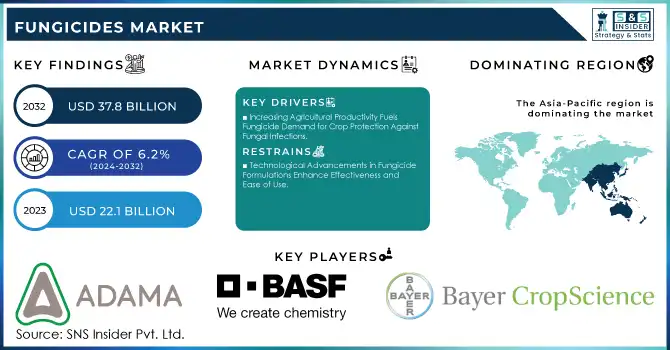The global fungicides market is projected to experience steady growth in the coming years, driven by the increasing demand for crop protection solutions, advancements in fungicide formulations, and growing awareness of the importance of protecting crops from fungal diseases. Fungicides play a critical role in safeguarding agricultural crops by controlling a wide range of fungal pathogens that can reduce yield quality and crop productivity.
The Fungicides Market Size was valued at USD 22.1 billion in 2023, and is expected to reach USD 37.8 billion by 2032, and grow at a CAGR of 6.2% over the forecast period 2024-2032.

Key Drivers of Market Growth
- Increasing Agricultural Demand: As global food demand rises due to population growth and changing dietary preferences, farmers are adopting fungicides to prevent crop losses from fungal diseases. The need to enhance food security, improve crop yield, and ensure product quality is driving the increased usage of fungicides across various crop types.
- Technological Advancements in Fungicide Formulations: The ongoing research and development of new fungicide formulations, including more targeted and effective solutions, are accelerating market growth. The introduction of systemic fungicides, biological fungicides, and eco-friendly alternatives is driving innovation in the industry.
- Climate Change and Emerging Plant Diseases: Climate change has caused shifts in weather patterns, leading to the emergence of new fungal diseases in various regions. The changing climate has made crops more susceptible to fungal infections, creating an increased need for fungicides to manage plant health and ensure agricultural productivity.
Challenges and Opportunities
Despite its growth potential, the fungicides market faces challenges, including rising concerns over the environmental impact of chemical fungicides and increasing resistance of fungi to commonly used fungicides. Regulatory restrictions and a shift towards more sustainable and organic farming practices are prompting the market to adapt. However, there are abundant opportunities in the development of biopesticides and sustainable fungicides that meet regulatory standards and align with the growing demand for eco-friendly solutions.
Market Trends
- Shift Towards Sustainable Fungicides: The increasing demand for environmentally friendly and sustainable fungicide alternatives is reshaping the market. Biological fungicides and organic solutions are gaining popularity due to their minimal environmental impact.
- Integrated Pest Management (IPM) Practices: IPM is being adopted by farmers to minimize the use of synthetic chemicals and promote natural pest control methods, including the use of fungicides in a balanced approach with other crop protection measures.
- Innovation in Fungicide Delivery Systems: Advancements in fungicide delivery systems, such as slow-release formulations and nanotechnology, are improving fungicide efficiency and effectiveness while reducing environmental impact.
Key Players
· Adama Agricultural Solutions
· BASF SE
· Bayer CropScience
· Cheminova A/S
· Dow AgroSciences
· DuPont
· FMC Corporation
· Lanxess AG
· Monsanto
· Nufarm Ltd
· Simonis B.V.
· UPL Ltd
· Syngenta AG
· Isagro S.p.A.
· Arysta LifeScience
· Corteva Agriscience
· Sumitomo Chemical Co., Ltd.
· Nihon Nohyaku Co., Ltd.
· Syngenta Crop Protection
· Corteva Agriscience
Conclusion
The fungicides market is expected to grow steadily due to the increasing demand for crop protection products in the agriculture sector. With ongoing innovations in fungicide formulations, the market is moving towards more sustainable solutions. As farmers face the challenge of protecting crops against emerging fungal diseases and climate-related issues, the fungicides market is well-positioned to meet these needs while also promoting eco-friendly and efficient solutions.
For more details @ https://www.snsinsider.com/reports/fungicides-market-3548
Contact Us:
Akash Anand – Head of Business Development & Strategy
info@snsinsider.com
Phone: +1-415-230-0044 (US)








